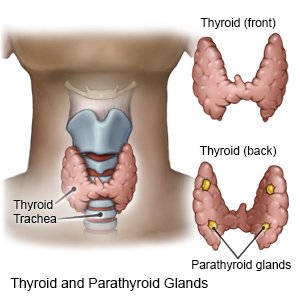Subclinical Hyperthyroidism
Medically reviewed by Drugs.com. Last updated on Aug 4, 2025.
What is subclinical hyperthyroidism?
Subclinical hyperthyroidism is a condition that develops when the amount of thyroid stimulating hormone (TSH) in your blood is low. TSH is made in the brain and controls how much thyroid hormone is made. Thyroid hormones help control body temperature, heart rate, growth, and weight. Subclinical hyperthyroidism can lead to hyperthyroidism.
 |
What causes subclinical hyperthyroidism?
If you have a family member with hyperthyroidism, your risk for subclinical is increased. Any of the following can cause hyperthyroidism:
- Autoimmune disease, such as Graves disease or Plummer disease
- Certain medicines, such as lithium, amiodarone, or aspirin
What are the signs and symptoms of subclinical hyperthyroidism?
The signs and symptoms may develop slowly, sometimes over several years.
- Weight loss, increased appetite, diarrhea, or constipation
- Increased sweating and heat intolerance
- Nervousness, restlessness, tremors, and difficulty sleeping
- Fast heart rate and fast breathing, even at rest
- Painful lump in your neck or bulging eyes
- Fatigue and muscle weakness
- Decreased or absent monthly periods
Related medications
How is subclinical hyperthyroidism diagnosed?
Your healthcare provider will ask about your symptoms and the medicines you take. Tell your provider about your medical history and if anyone in your family has thyroid disease. A blood test will show your TSH level.
How is subclinical hyperthyroidism treated?
You may not need any treatment, or you may need any of the following:
- Antithyroid medicines decrease thyroid hormone levels and your symptoms.
- Radioactive iodine is given to damage or kill some thyroid gland cells. This may decrease the amount of thyroid hormone produced. Tell your healthcare provider if you know or think you are pregnant. This medicine can be harmful to an unborn baby.
- Surgery may be done to remove all or part of the thyroid gland.
Treatment options
The following list of medications are related to or used in the treatment of this condition.
Call 911 for any of the following:
- You have sudden chest pain or shortness of breath.
- You have a seizure.
- Your heart is beating faster than usual.
- You feel like you are going to faint.
When should I contact my healthcare provider?
- You have a fever.
- You have pain, redness, and swelling in your muscles and joints.
- Your signs and symptoms return or become worse.
- You have questions or concerns about your condition or care.
Care Agreement
You have the right to help plan your care. Learn about your health condition and how it may be treated. Discuss treatment options with your healthcare providers to decide what care you want to receive. You always have the right to refuse treatment. The above information is an educational aid only. It is not intended as medical advice for individual conditions or treatments. Talk to your doctor, nurse or pharmacist before following any medical regimen to see if it is safe and effective for you.© Copyright Merative 2025 Information is for End User's use only and may not be sold, redistributed or otherwise used for commercial purposes.
Learn more about Subclinical Hyperthyroidism
Treatment options
Care guides
Symptoms and treatments
Medicine.com guides (external)
Further information
Always consult your healthcare provider to ensure the information displayed on this page applies to your personal circumstances.
